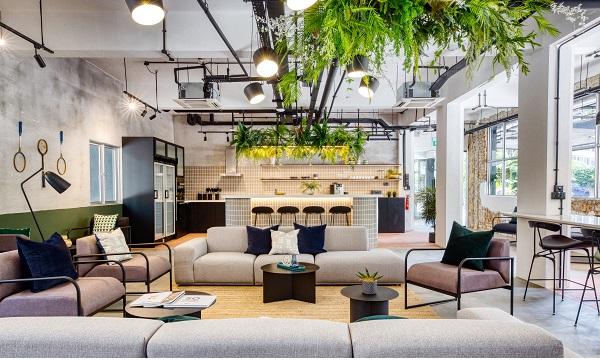
Will co-living survive in Singapore's fast-changing rental market?
Despite the hype on 'flexible living', landlords still prefer the traditional model.
For a time, co-living has been a buzzword given its cheaper rents that are already inclusive of all amenities, made for professionals who can’t afford to buy a house or rent an apartment given the rising rents in the city.
And for space-starved Singapore, the concept of spaces with shared facilities is indeed ideal. However, the government think tank Center for Liveable Cities (CLC) stated in its 2019 report that the Lion City’s co-living sector is still fledgling despite its emergence in the mid-2010s.
JLL’s latest data in 2018 on co-living firms also stated that they only occupy 1% of Singapore’s total space. There are only a few co-living firms in Singapore, most well-known are Hmlet, China-based Mamahome, Ascott and COVE.
“This is surprising since co-living firms, unlike their counterparts from the home-sharing and ride-sharing industries, face no direct institutional or legal barriers to growth,” CLC stated.
CLC further noted that operators are even free to sublet individual bedrooms in an apartment as long as they obtain the agreement of their landlords and comply with the Urban Redevelopment Authority’s (URA) requirements that residents should stay in the unit for no shorter than three consecutive months, and the total number of occupants per unit does not exceed six. Unlike traditional serviced residences, co-living companies do not need to obtain estate agent, hotel or other licences.
“A key impediment to the growth of co-living businesses is the difficulty in acquiring and maintaining a long-term supply of rental housing units,” CLC said.
This comes on the back of its typical tenancy agreements that don't last one or two years. What’s more, with Singapore’s rapidly changing property scene, landlords still prefer to retain the flexibility to cash out on their investment properties at short notice whenever housing prices rise. As a result, co-living firms will find it difficult to make long-term plans.
“Co-living firms not only compete with other potential tenants for residential space in an established leasing market, but also have to meet their landlords’ demand for market rate rentals, whilst keeping co-living rents affordable and attractive to their target customer base,” CLC noted.
To solve this, Hmlet has been partnering with real estate firms in order to have access in freely customise the design and manage the tenants on behalf of the landlords.
“The Hmlet model is most beneficial in a time when developers and investors are shifting their focus away from traditional build-to-sell and towards build-to-rent. For example, in 2019 Hmlet partnered with LHN Facilities Management, an indirect subsidiary of real estate management services group LHN Limited for the development and launch of Hmlet Cantonment,” said Yoan Kamalski, founder & CEO of Hmlet.
However, CLC said there are only a very few developers with the financial capacity to retain ownership of sizeable numbers of residential units, limited by the cost brought by Singapore’s laws and regulations. Most housing developers also usually start marketing and sell units in their projects as soon as they obtain planning and other regulatory approval as progress payments received from purchasers are an important source of funds for construction.
“As for the small number of completed projects still under the sole ownership of developers, many are already being leased on the rental market (for example, through corporate leasing arrangements) or have been converted into serviced apartments,” CLC added.
The traditional model still thrives
Contrary to their co-living counterparts, serviced residences are doubling down on growth, taking advantage of the government’s decentralisation efforts to put more commercial sites outside CBD. “Unlike other Asian cities with traffic congestion challenges, distance is never a problem due to the highly efficient and well-managed transportation infrastructure. As such, accommodation outside the CBD is on high demand now,” said Dean Schreiber, the interim CEO of Oakwood.
Richard Tan, VP for serviced suites at Pan Pacific Group, cited some serviced residences being developed outside CBD. These include Balestier, Rochor, and Farrer Park, whose growth has seen a saturation in supply.
With the entry of co-living firms, Tan added that serviced residences have started struggling with the long-term segment. “We are seeing more ‘hybrid’ serviced apartments which operate like hotels in terms of allowing short term stays (less than six nights). Serviced apartments will need to better segment their markets to drive revenue and profitability and employ a different strategy given shorter stays and higher guest turnaround,” he added.
In response to these developments, Oakwood shared that they aim to incorporate smart home technology into their residences. They partnered with McLaren Technologies to develop the ICE Mobile app, which allows guests to check in the residences and incorporates manuals to guide guests on the use of appliances in the apartments. They also teamed up with Samsung and LUMAS Galarie Singapore to ‘digitalise’ art for long-staying guests to take art pieces.
Oakwood also plans to launch its mobile club lounge service by end-2020, which is said to be the first of its kind in Asia. Oakwood partnered with Brass Lion Distillery to offer the ‘Gin Staycation’, which allows evening cocktails and canapes to be delivered to each guest’s apartment at Oakwood Premier AMTD Singapore. This includes a full bottle of Brass Lion Gin and a complimentary guided tour of Brass Lion’s distillery with two-way transportation.
























 Advertise
Advertise









